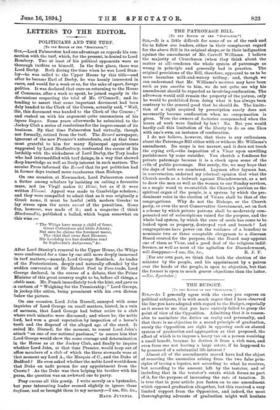THE PATRONAGE BILL.
[TO THE ED/TOR OP TER "SPECTATOR."]
SIEjIt is a little difficult for some of us of the rank and file to follow our leaders, either in their complacent regard for the above Bill in its original shape, or in their indignation against the amendment of Mr. Carvell Williams. I believe the majority of Churchmen (when they think about the matter at all) condemn the whole system of patronage as wrong in principle and generally bad in practice. The original provisions of the Bill, therefore, appeared to us to be mere harmless milk-and-watery trifling ; and, though we can understand that Mr. Williams's motives may have been such as you ascribe to him, we do not quite see why his amendment should be regarded as involving confiscation. The advowson would still remain the property of the patron, only he would be prohibited from doing what it has always been contrary to the general good that he should do. The limita- tion of a right acquired by prescription surely does not necessarily become confiscation when no compensation is given. Were the owners of factories compensated when the hours of work were limited by law ? No. But you would hardly call this limitation of the liberty to do as one likes with one's own, an instance of confiscation.
I do not believe, however, that there is any enthusiasm about the Patronage Bill either with or without Mr. Williams's amendment. Its scope is too narrow, and it does not touch the crying evil,—the imposition of a Vicar upon unwilling parishioners by some outsider. You cherish a fondness for private patronage because it is a cheek upon some of the evils of public patronage. But surely, Sir, we may hope that the days of both are numbered. Layman after layman has, in conversation, endorsed my (clerical) opinion that what the Church needs as a bulwark against Disendowment, as a net to draw the men as well as the women to our Sunday services, as a magic wand to re-establish the Church's position as the spiritual organ of the people, is a system by which the pre- dominant voice in the election of "Vicars shall be that of the congregations. Why do not the Bishops, or the Church party, or even the next Conservative Government, set on foot a scheme by which private patrons shall be moderately com- pensated out of subscriptions raised for the purpose, and the whole bad system, by which the cure of souls has come to be looked upon as property, destroyed root and branch P Let congregations have power (on the voidance of a benefice) to nominate two or three acceptable clergymen to a diocesan Board created for the purpose, that the Board may appoint one of them as Vicar, and a good deal of the religious indif- ference, as well as most of the agitation for Disendowment, will disappear.—I am, Sir, Sze., R. J. F.
[For our own part, we think that both the election of the minister by the people, and his appointment by a patron over the heads of the people, is open to objection, but that the former is open to much graver objections than the latter. —ED. Spectator.]


































 Previous page
Previous page